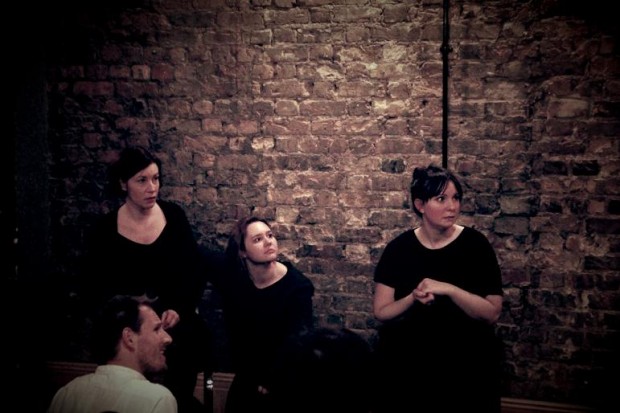You have no items in your cart. Want to get some nice things?
Go shopping
“We believe theatre is more than just words. It is about creating a world.” So declare Scrawny Cat Theatre Company on their website, and their immersive mission is clear to see in Forget Me Not, their latest production at the Etcetera Theatre. This dystopia was directly inspired by recent cuts in arts funding and conceives of a world where all forms of art are outlawed.
The very title is a reference to something Vincent Van Gogh once said. The full quotation is repeated several times in the play, coming to take on great importance, perhaps most crucially in the phrase: “If only you pay attention to it you will see that certain stars are lemon-yellow, others pink or a green, blue and forget-me-not brilliance.” Gogh was marginalised in his era, only later recognised as a genius. He becomes a symbol of artistic brilliance in this dystopian world where creativity itself is sidelined, seen as something fundamentally wrong in the individual.
The most crucial theme in Forget Me Not is the importance of stories and the passing on of stories in a world where it is deemed unacceptable for you to use your imagination. The telling of stories and the use of refrains are the most successful elements of the play – it’s here that the passion of the actors, their genuine love of storytelling, is most keenly felt. Lively retellings of Gone with the Wind and The Nutcracker were exuberantly played out.
In a world where telling such stories and letting your imagination fly is banned, listening also takes on key significance. Forget Me Not in fact begins with a monologue largely about listening, which is repeated several times in the play: “I listen. I watch. I see you…I am different. Odd. I do not fit…” This highlights the sense that people are constantly monitored by the dystopian state, but also the five rebels’ alienation from a society which has left the arts behind.
Indeed, in a parody of the leader of this new world, the actors bombastically trumpet that “art is a lie…it is immoral, dishonest”. Equally bombastic is the trial scene, in which a woman caught being creative is made an “example”. The Stalinist absurdity of the trial is emphasised by the actors, with the self-aware victim herself playing up to the audience. One character satirically played the role of a “foregone conclusion” – as, of course, the victim was always going to be deemed guilty. The excessive moralising and pomp of the judges also recalled those of Kafka’s The Trial and the eponymous song from Pink Floyd – from that most dystopian of albums, The Wall.
A particularly engaging exchange between the five artistic rebels was around just how the banning of art became accepted and internalised in their society. It was made clear that the dystopian landscape they came to inhabit didn’t happen overnight. The erasure of individuality and the disintegration of art, literature and music was a gradual process; otherwise, the characters claim, they would have stepped forward sooner. There is a sense that the world slowly, bit by bit (“one small thing, then another and another”), sleepwalked into this nightmare, which makes it all the more disturbing. As one character says, “we just let it slip through our fingers”.
Forget Me Not is very well acted throughout, albeit not entirely polished. The storyline is, at times, quite difficult to follow, veering backwards and forwards in time. Nor was there a strong sense of the structural machinery behind this dystopian world, or of how exactly it came into being. There are mentions here and there – the fact that you give up your child to a community of “friends” who look after it in the name of the state and presumably are tasked with indoctrinating him/her; the mentions of “examples” who are tried, dragged through the streets and sent to be “corrected”; daily broadcast transmissions from the leadership – but these are not developed enough.
The ending itself is abrupt and the question which opens the play – namely, whether there is a “traitor” in the midst of the cental cast – is never resolved. Despite all of this, Forget Me Not teems with a range of fascinating, innovative ideas and holds a lot of promise.
Considering that Forget Me Not was set on a bare stage, with just five chairs and five actors enacting their respective roles, the performances were compelling and the ideas that emerged powerful. There were many memorable poetic refrains: one such line was “revenge sits on a wooden bench and waits”. Something about this image was very disquieting, in the undertones of threat lurking behind revenge’s patience. Forget Me Not may have lacked a certain tightness, but by and large the quality of the writing, and the presence of the actors, made it a pleasure to be so immersed.
Forget Me Not is now finished, but see more about Scrawny Cat Theatre Company on their website.

About Ana Malinovic
Ana graduated from Warwick University with a BA in English and American Literature in 2010. Her dissertation was centred on dystopian elements in the fiction of Kafka. She enjoys uncovering innovative works of fiction by a diverse range of authors. She also spends much of her time roaming around London's arts and culture scene overexcitedly. Check out her blog




